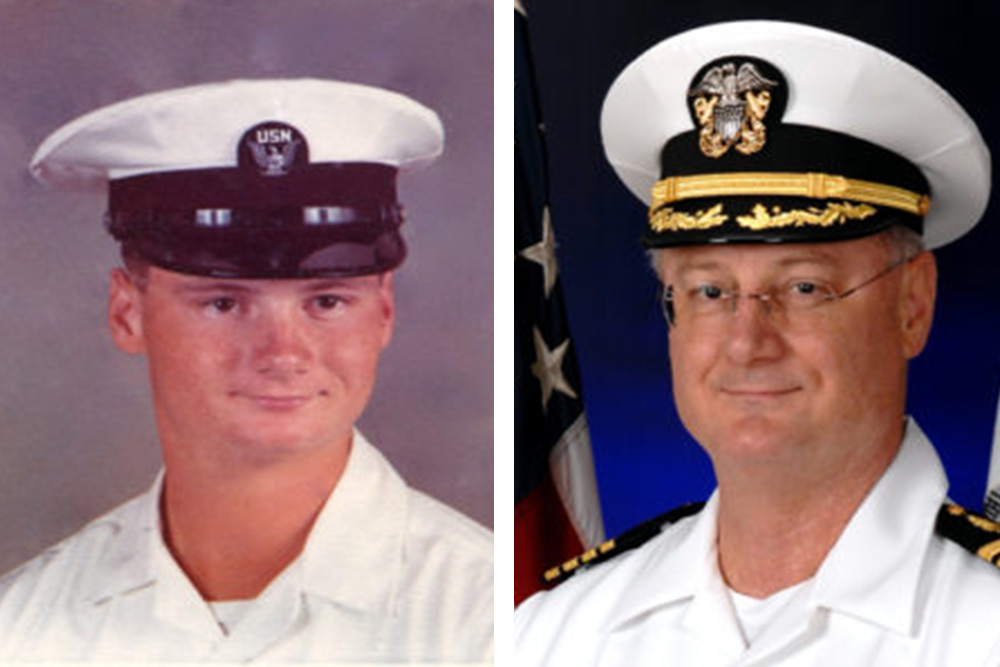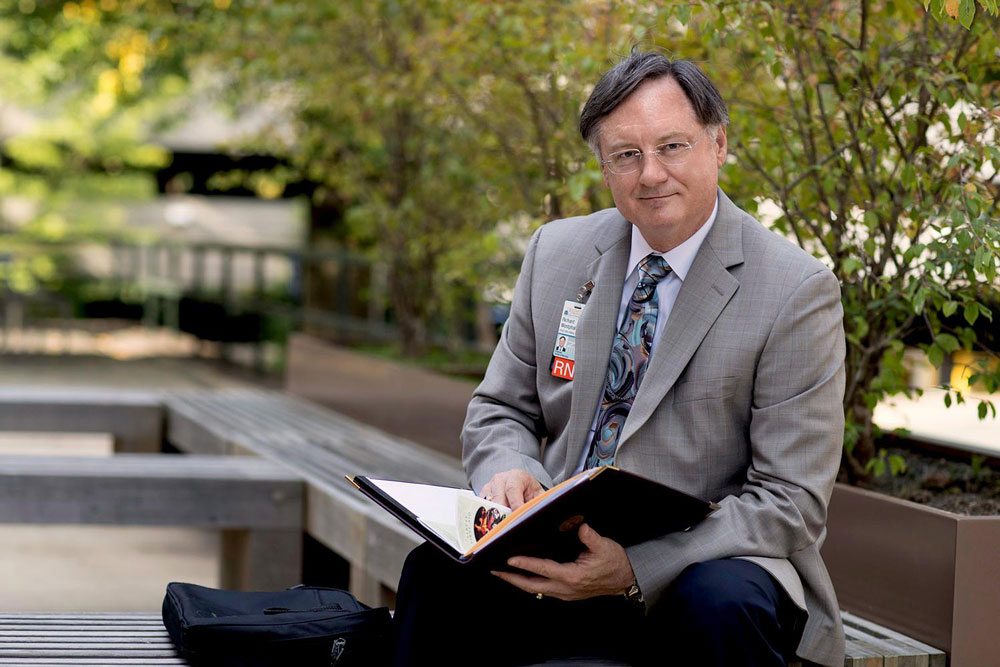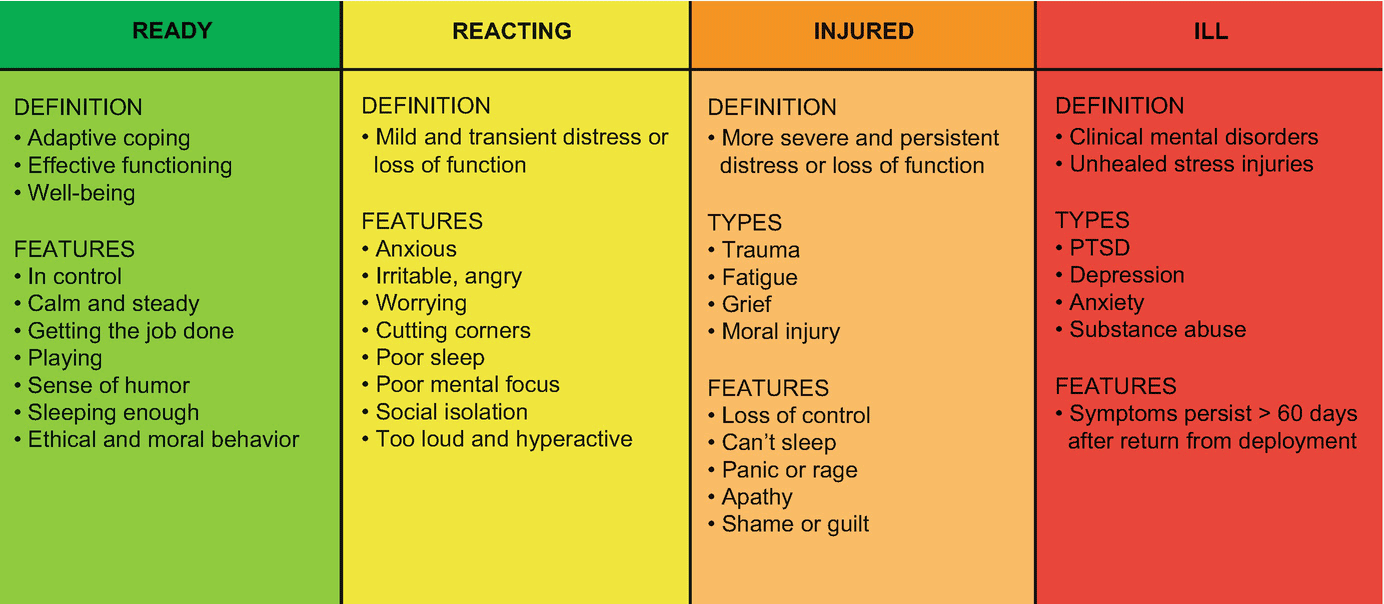Have You Ever Served?

Veteran's Day, observed annually on Nov. 11, is a federal holiday for honoring military veterans who served in the United States Armed Forces. To mark the holiday, we offer the following brief profile and thoughts of Richard Westphal, PhD, RN, PMHCNS/NP-BC, FAAN, an award-winning professor, nurse scientist and scholar, the Woodard Clinical Scholar, and co-director of UVA Health's Wisdom and Well-Being Program.
Westphal notes that clinicians often begin a care session by asking patients, "Have you ever served?" But that's a question all of us should be asking, with both respect and recognition.
We thank all our veterans, especially those who are our alumni, working here at UVA and UVA Health, and those who serve across the Commonwealth, country, and around the world, for their service, and for being a part of defending and supporting our Constitution. 🇺🇸
What do you do at UVA and at UVA Health?
I am a professor in the School of Nursing. My area of expertise is in occupational stress, psychological trauma, and organizational response to high-stress events. I am the co-director of the health system's Wisdom and Well-Being Program with Dr. Peggy Plews-Ogan. The Wisdom and Wellbeing Program provides a range of assessment, resilience, and intervention activities to support the entire workforce to address work-related sources of stress.
"[Clinicians should always] ask, 'Did you or a family member ever serve in the military?' If yes, 'What branch?' Then thank them for being a part of supporting and defending the Constitution."
Professor Richard Westphal, Woodard Clinical Scholar, on caring for veterans
In which branch did you serve? What was your rank? What was your job in the military?
I served in the U.S. Navy for 33 years of active duty. I first enlisted in 1974 before the end of the Vietnam War as a Hospital Corpsmen. In my first enlistment, I had four different duty stations with my longest as a shipboard operating room technician running a primary care clinic for over 650 Sailors. In 1979, I left the Navy to complete my bachelor's nursing degree with support of the GI Bill. I had no intention of returning to active duty. Upon graduation in 1983, I had several nursing job options and I added the Navy to the list as a point of comparison; it was the best offer.
I re-entered the Navy with a commission as an Ensign and moved with my family to Oakland, California. My clinical focus of mental health and psychiatric nursing began shortly after reporting to Oakland Naval Hospital. While in my PhD program here at the UVA School of Nursing I was promoted to Captain. My dissertation work on mental illness stigma within large organizations led to my last assignment in Washington, DC, as a program manager for the psychological health and traumatic brain injury programs for Navy Medicine.
What does Veteran’s Day mean to you? Do you celebrate it? If so, in what way?
Every day is Veteran's Day for me. The thoughts and memories of my experience, shipmates, colleagues from other services, and things that most people would never believe is a part of who I am. Veteran's Day has lots of cues to bring those experiences front and center.
I would not say that I celebrate Veteran's Day in the way that most people think of celebrating a day. I use Veteran's Day to reflect on my military oath to support and defend the Constitution of the United States as embodied by all the people who live here; not just the ones I agree with. I reflect on the lives of colleagues, past and present, who answered the call to serve. My family will reminisce about people, places, and times that were a part of our journey. And, I do wear something that connects me to my core values.


How did your military experience impact your role in healthcare?
The military experience defined my role in healthcare. My training and oath as a Navy Hospital Corpsmen shaped my entire healthcare journey. From the role as a medic, to a nurse, an advance practice provider, and clinical researcher were all informed and or supported by my naval service. Navy medicine provided opportunities and training that cannot be found in any university or other health system.
Has it informed your work in Wisdom & Wellbeing?
In 2021, healthcare, as a social entity, is beginning to discover that taking care of our team members is important. Over 30 years ago, the Navy supported my master's degree as a consultation-liaison clinical nurse specialist where my role was to take care of the corpsmen, nurses, and doctors who took care of military members and their families. That work led to me designing and implementing an occupational stress control program for Navy Medicine world-wide. That program included the models of the stress continuum, recognition of stress injuries, and stress first aid to help an injured peer. The Wisdom and Wellbeing Program enhanced that Navy model by adding wisdom and positive practices as foundational knowledge and skills.
Is there anything more you’d like to share?
The story of my military journey is a common one for many service members. I grew up in the dairy lands of Minnesota and Wisconsin and dreamed of leaving. I did not engage in high school in a way that would make college an option. So I rolled the dice of life and enlisted in the Navy. Later, my spouse and I decided to roll the dice again when I was commissioned.
Navy life can be a bit nomadic, so home was always the place with the greatest number of boxes; here in Charlottesville is the time to unpack the boxes.
Like healthcare, military service requires the support and engagement of the whole family. My spouse and daughters have had their own non-uniformed military careers; yet they do not get thanked for their service.
I would encourage our co-workers to ask each other, "Did you or a family member ever serve in the military?" If yes, "What branch?" Then thank them for being a part of supporting and defending the Constitution.
###
